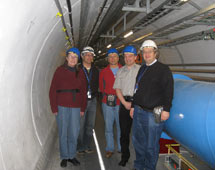
Handy Links
SLAC News Center
SLAC Today
- Subscribe
- Archives: Feb 2006-May 20, 2011
- Archives: May 23, 2011 and later
- Submit Feedback or Story Ideas
- About SLAC Today
SLAC News
Lab News
- Interactions
- Lightsources.org
- ILC NewsLine
- Int'l Science Grid This Week
- Fermilab Today
- Berkeley Lab News
- @brookhaven TODAY
- DOE Pulse
- CERN Courier
- DESY inForm
- US / LHC
SLAC Links
- Emergency
- Safety
- Policy Repository
- Site Entry Form

- Site Maps
- M & O Review
- Computing Status & Calendar
- SLAC Colloquium
- SLACspeak
- SLACspace
- SLAC Logo
- Café Menu
- Flea Market
- Web E-mail
- Marguerite Shuttle
- Discount Commuter Passes
-
Award Reporting Form
- SPIRES
- SciDoc
- Activity Groups
- Library
Stanford
Around the Bay
LARP Collaboration Meeting Begins Today
Today, SLAC welcomes onsite members of the U.S. LHC Accelerator Research Program, or LARP, to the 15th LARP Collaboration Meeting, CM15. With the Large Hadron Collider now successfully gathering data, efforts to improve its function are entering a new phase. During CM15, nearly 50 representatives from LARP member laboratories Brookhaven National Laboratory, Fermi National Accelerator Laboratory, Lawrence Berkeley National Laboratory and SLAC will meet with representatives from CERN and the Department of Energy to determine how the U.S. collaboration can best aid in improving the performance of the LHC.
SLAC has already made significant contributions to the LHC. SLAC projects include the development of a rotating collimator to remove "halo" particles from the proton beam, as well as providing assistance with LHC beam diagnostics and the LHC Low-Level RF system, which monitors the radio waves responsible for speeding up particles in the giant particle collider's beam.
New projects are already in the works. A SLAC/LBL/CERN collaboration is developing techniques to rein in so-called "fast instabilities," generally caused by interactions between the proton beam and its environment. True to their name, such instabilities arise quickly and can just as quickly oscillate out of control if not contained.
According to Tom Markiewicz, SLAC accelerator physicist and deputy director of the LARP program, SLAC and its U.S. collaborators have much more to do. CERN has recently restructured planned LHC luminosity upgrades into the High Luminosity LHC project, a plan to ultimately increase the number of protons in the beam by an order of magnitude and thus increase the number of collisions for physicists to study. LARP must determine how it fits into this effort.
"CM15 will be critical in placing LARP's efforts into the larger program," Markiewicz said
óLori Ann White
SLAC Today, November 1, 2010
